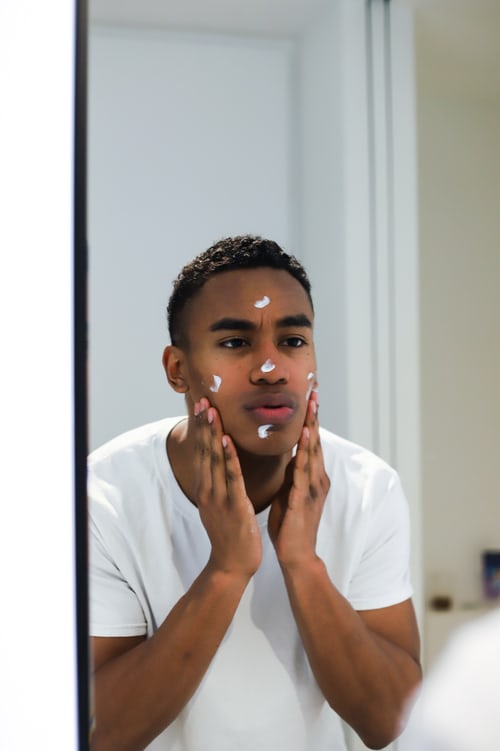
Winter Skincare Tips for Healthy Winter Skin
Winter can be particularly harsh on the skin, bringing cold, dry air that can leave skin red and irritated.
Not only can winter’s colder temperatures leave your skin red and irritated, but it can also make it more dry and sensitive than usual. Additionally, many people who have pre-existing skin conditions such as eczema and psoriasis experience more frequent and severe flare-ups during the winter months.
Although, with winter coming around quick and fast, it’s important to prepare with the right winter skincare tips before the colder season is in full swing, no matter the severity of your skin’s condition.
Protecting your skin from the cold is not just about looking good. As your body’s largest organ, the skin provides an essential protective barrier against harmful pathogens and injuries from the environment - and your body counts on this throughout your entire life.
So, it’s important to stay well protected by keeping your skin healthy throughout the colder months.
Here are our top winter skincare tips.
Keep Your Skin Moisturised
Perhaps the most important winter skincare tip to consider is to keep your skin moisturised. As temperatures get colder, the amount of moisture in the air reduces. In contrast to summer’s more humid atmospheres, winter can feel crisp, cold and dry - even with all that extra rain.
With less moisture in the air, it’s important to keep your skin well moisturised in the winter in order to maintain your protective barrier and prevent any damage to your skin. A good winter moisturiser is usually one that helps form your skin’s protective barrier, whilst helping it hold on to moisture.
To keep your skin protected during winter, look for a moisturiser that contains ceramides. Ceramides are naturally produced by your skin, but when stripped away by harsh environmental aggressors, your skin can suffer.

Treating Eczema Flare-ups in Winter
Another way to help protect and heal your winter-damaged skin is with emollients, which are designed to both soften and moisturise skin. Emollients are especially suitable for those with skin conditions that may become worse in the winter, such as eczema or psoriasis.
Dermol cream offers an antimicrobial emollient solution perfect for treating eczema flare-ups in winter, providing your skin with protection against winter’s harsh and dry conditions.
Reduce Shower Time and Temperature
Whilst it may be tempting to take a long hot shower when it’s so cold and dark outside, this can sadly be damaging to your skin. Hot showers or baths can actually dehydrate your skin and strip away its natural oils - which are more important than ever over the winter months.
You might notice that your skin is slightly itchy and red after taking a shower. This is a sign that you’ve stayed too long, or perhaps had the shower water slightly too warm. But, not to worry! There are things you can do to help repair your skin and keep it well protected for your days out in the winter weather.
For healthy winter skin, firstly consider taking shorter showers at lower temperatures. However, if you have overdone it, take extra care to moisturise your skin with oil-based products after getting out of the shower.
Bonus Winter Skincare Tip: Use a Shower Emollient
For healthy winter skin, not only can lowering your shower temperature and duration help prevent your skin from drying out, but you could also consider using a shower emollient such as Dermol 200 Shower Emollient. A shower emollient can be used as an alternative to soap, formulated with emollient oils that are much less drying than soap.
Adjust Your Skincare Regime for Winter
If you’re somebody who keeps their skin healthy with a daily regime, it might be a good idea to adjust your usual skincare routine for something more suitable for winter. Whilst summer skincare regimes are most suitable for preventing excess oil, these same products may be slightly too drying in combination with the winter’s dry and harsh weather.
Consider adding hydrating serums to your skincare routine if you don’t already, such as hyaluronic acid alongside protective moisturisers. And with the winter’s harsher conditions, be ready to relieve your skin’s irritability with a suitable dry skin treatment such as Diprobase Emollient Cream.
Adjusting your routine to include more hydrating elements will help protect your skin from drying out in the winter, ensuring that your skin’s natural moisture is retained more effectively to prevent any drying or damage.
Additionally, if you regularly use an acne treatment such as Acnecide, it is important to use a gentle moisturiser to help prevent the skin from drying in colder weather.
Bonus Skincare Tip: Avoid Products Containing Alcohol
If your skincare regime includes products containing alcohol, it will be a good idea to stop using these over the winter. When your skin is dry and itchy, alcohol can actually strip away the skin’s natural oils, and as a result, make your skin even drier.
This can lead to some quite uncomfortable irritation when combined with winter’s cold and dry conditions.
Winter Skincare Tips for the Whole Body
Protecting your skin from the winter temperatures is not just about the face, it is important to consider your whole body. And although the face often sees the most exposure to winter temperatures, our entire bodies experience drastic changes over the winter seasons.
For instance, we may wrap up warm in layer after layer of clothing to keep warm, but this can actually lead to dry and itchy skin during the winter months. Our skin is then met by central heating when getting home, which often only worsens itchy skin.
When your skin is dry, itchy or red, this can of course be very uncomfortable. Moisturise your skin daily with a gentle treatment such as Bio-Oil.
Aside from our faces, our hands and feet can also suffer in the winter months. The cold conditions mean we tend to wrap up with thick socks, heavier boots and gloves. Whilst this can help keep us warm, it can also reduce the amount of ventilation that our hands and feet receive - leading to uncomfortable conditions including skin rashes and Athlete's Foot.
Although more common in summer, Athlete’s Foot is still commonly reported to health professionals over the winter months due to the additional layers we wear on our feet. There are many treatments available for Athlete’s Foot, including Canesten Hydrocortisone Cream.
Remember to Eat Right
Your skin is kept happy and healthy by a range of things, from serums, treatments and moisturisers, but also importantly, your diet. Maintaining a healthy diet can help keep your skin in better condition, helping it form the necessary protective cells to prevent redness and dryness in the winter weather.
For healthy winter skin, consider eating foods that are rich in vitamin C, antioxidants and other important nutrients. These foods can include:
- Carrots
- Beetroot
- Green leafy vegetables
- Broccoli
- Berries
These healthy foods can help support your skin with the strength it needs when facing colder temperatures in winter.

Stay Hydrated
Similarly to eating well, you will need to make sure you are staying hydrated and drinking plenty of water. Drinking plenty of water will help keep your skin healthy any time of year, helping your body flush out toxins and prevent pores from getting clogged.
But most importantly, staying hydrated with lots of water will help maintain your skin’s elasticity.
Elasticity is needed to ensure that the skin does not crack when exposed to dry winter conditions. It is much more common for our lips and hands to crack during winter, but this can also occur elsewhere.
To help prevent this, it is important to stay hydrated in winter to provide your skin with the moisture it needs to sustain its usual levels of elasticity.
You Still Need SPF!
It may seem like an odd idea to wear SPF in the winter, especially in the UK where things are generally quite grey, dark and cloudy during this season. But, don’t be fooled, the sun’s UV rays are able to penetrate clouds and damage the skin.
And be sure to wear SPF before you go outside on brighter snowy days. The sun can actually reflect off the snow’s surface and increase your risk of UV exposure. So whether you’re just taking a stroll or building a snowman, be sure to slap on that sunscreen.
Winter Skincare Tips: Summary
When preparing for the colder months, it’s important to consider our winter skincare tips to keep your skin in top condition. From staying moisturised and hydrated, eating and drinking healthily, to protecting your skin with SPF, there are many changes you can make to ensure your skin is well protected this winter.
Speak to an expert
If you would like to speak to our experts about your skin concerns in the run up to winter, our online healthcare team can provide you with the right advice and information.
Speak to our experts at [email protected], or complete our handy online form.





